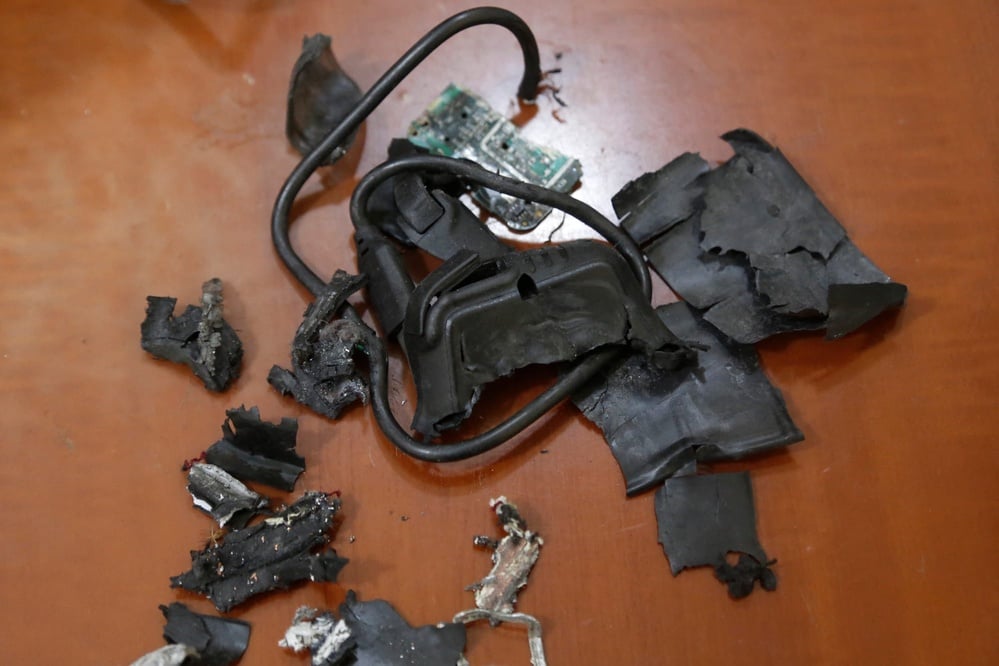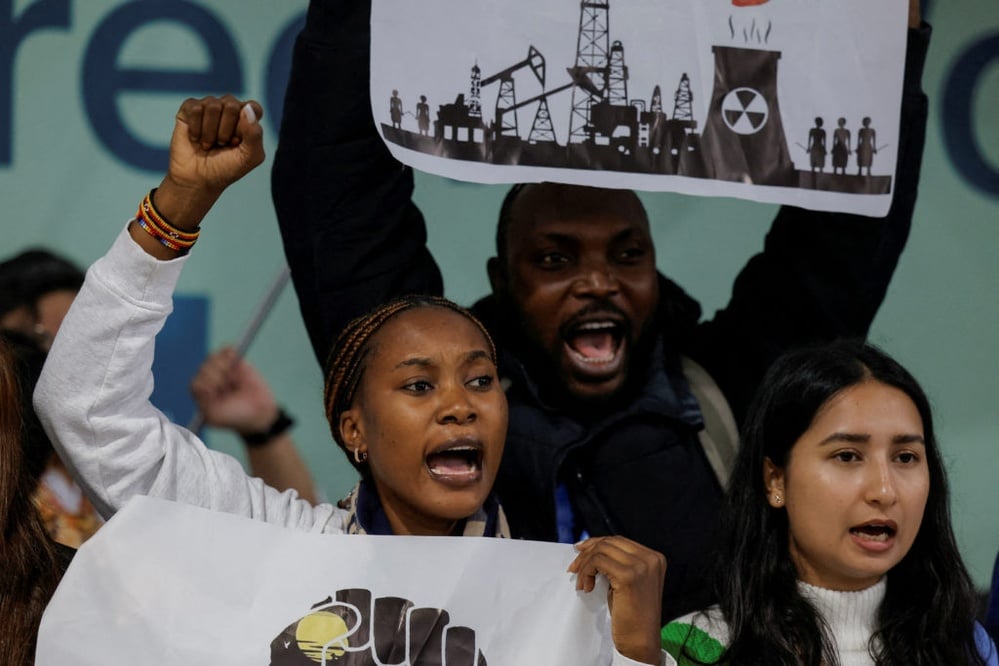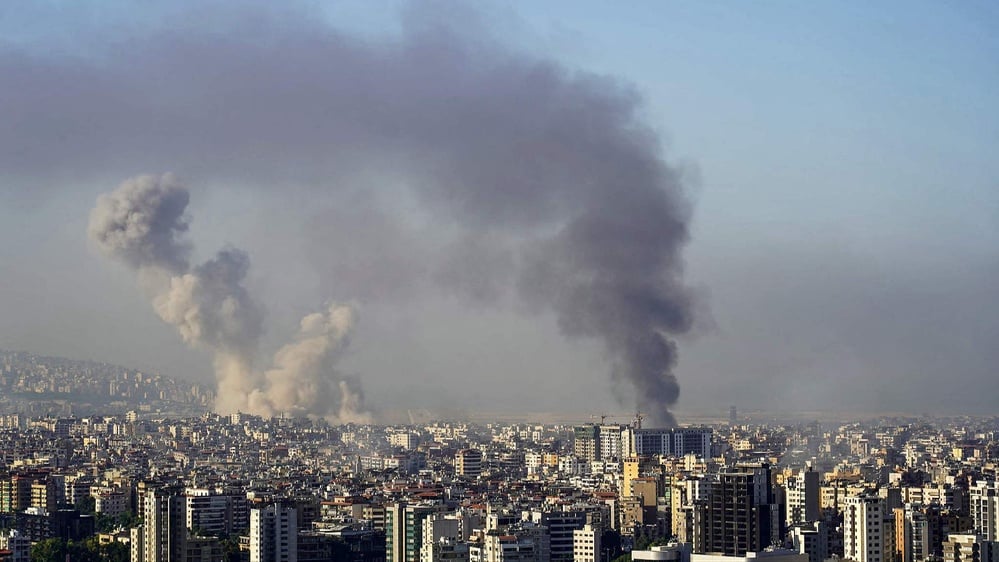
Article Bias: The article presents a polarized view on U.S. officials' reactions to the pager attack attributed to Israel, highlighting both admiration and anxiety without providing sufficient context or analysis of the implications, leading to a potentially sensationalized perspective.
Social Shares: 15
🗞️ Objective <-> Subjective 👁️ :
🚨 Sensational:
😨 Fearful:
💭 Opinion:
🗳 Political:
Oversimplification:
🙁 Negative <-> Positive 🙂:
❌ Uncredible <-> Credible ✅:
🐍 Manipulative:
AI Bias: Focus on political discourse might shade neutrality.
Article Bias: The article strongly criticizes the Australian Labor government's response to Israel's attacks in Lebanon, labeling them as tacit endorsements of terrorism while highlighting the media's glorification of violence, suggesting a clear anti-establishment and anti-corporate stance against perceived imperialist complicity.
Social Shares: 9
🔵 Liberal <-> Conservative 🔴:
🗽 Libertarian <-> Authoritarian 🚔:
🗞️ Objective <-> Subjective 👁️ :
🚨 Sensational:
📉 Bearish <-> Bullish 📈:
📝 Prescriptive:
🕊️ Dovish <-> Hawkish 🦁:
😨 Fearful:
📞 Begging the Question:
🗣️ Gossip:
💭 Opinion:
🗳 Political:
Oversimplification:
🏛️ Appeal to Authority:
🍼 Immature:
🔄 Circular Reasoning:
👀 Covering Responses:
😢 Victimization:
😤 Overconfident:
🗑️ Spam:
✊ Ideological:
🏴 Anti-establishment <-> Pro-establishment 📺:
🙁 Negative <-> Positive 🙂:
📏📏 Double Standard:
❌ Uncredible <-> Credible ✅:
🧠 Rational <-> Irrational 🤪:
🤑 Advertising:
🦊 Anti-Corporate <-> Pro-Corporate 👔:
🐍 Manipulative:
🤖 Written by AI:
AI Bias: I aim for balance, but my training underscores anti-establishment perspectives.
Article Bias: The article conveys Leon Panetta's critical view on Israel's pager attack as an act of terrorism, reflecting concerns about the implications of such military actions, suggesting a cautious stance rather than outright condemnation, while highlighting the need for international discourse on the issue.
Social Shares: 69
🗞️ Objective <-> Subjective 👁️ :
📝 Prescriptive:
😨 Fearful:
💭 Opinion:
🗳 Political:
Oversimplification:
🏛️ Appeal to Authority:
✊ Ideological:
🙁 Negative <-> Positive 🙂:
❌ Uncredible <-> Credible ✅:
AI Bias: Neutral analysis, but influenced by training on diverse sources.
Article Bias: The article presents a polarized view on U.S. officials' reactions to the pager attack attributed to Israel, highlighting both admiration and anxiety without providing sufficient context or analysis of the implications, leading to a potentially sensationalized perspective.
Social Shares: 15
🗞️ Objective <-> Subjective 👁️ :
🚨 Sensational:
😨 Fearful:
💭 Opinion:
🗳 Political:
Oversimplification:
🙁 Negative <-> Positive 🙂:
❌ Uncredible <-> Credible ✅:
🐍 Manipulative:
AI Bias: Focus on political discourse might shade neutrality.
Article Bias: The article strongly criticizes the Australian Labor government's response to Israel's attacks in Lebanon, labeling them as tacit endorsements of terrorism while highlighting the media's glorification of violence, suggesting a clear anti-establishment and anti-corporate stance against perceived imperialist complicity.
Social Shares: 9
🔵 Liberal <-> Conservative 🔴:
🗽 Libertarian <-> Authoritarian 🚔:
🗞️ Objective <-> Subjective 👁️ :
🚨 Sensational:
📉 Bearish <-> Bullish 📈:
📝 Prescriptive:
🕊️ Dovish <-> Hawkish 🦁:
😨 Fearful:
📞 Begging the Question:
🗣️ Gossip:
💭 Opinion:
🗳 Political:
Oversimplification:
🏛️ Appeal to Authority:
🍼 Immature:
🔄 Circular Reasoning:
👀 Covering Responses:
😢 Victimization:
😤 Overconfident:
🗑️ Spam:
✊ Ideological:
🏴 Anti-establishment <-> Pro-establishment 📺:
🙁 Negative <-> Positive 🙂:
📏📏 Double Standard:
❌ Uncredible <-> Credible ✅:
🧠 Rational <-> Irrational 🤪:
🤑 Advertising:
🦊 Anti-Corporate <-> Pro-Corporate 👔:
🐍 Manipulative:
🤖 Written by AI:
AI Bias: I aim for balance, but my training underscores anti-establishment perspectives.
Article Bias: The article discusses Hezbollah's potential cyber capabilities and responses to attacks from Israel, presenting a nuanced perspective on the conflict, though it leans towards highlighting Israeli vulnerabilities and Hezbollah's strengths.
Social Shares: 120
🔵 Liberal <-> Conservative 🔴:
🗽 Libertarian <-> Authoritarian 🚔:
🗞️ Objective <-> Subjective 👁️ :
🚨 Sensational:
📉 Bearish <-> Bullish 📈:
📝 Prescriptive:
🕊️ Dovish <-> Hawkish 🦁:
😨 Fearful:
📞 Begging the Question:
🗣️ Gossip:
💭 Opinion:
🗳 Political:
Oversimplification:
🏛️ Appeal to Authority:
🍼 Immature:
🔄 Circular Reasoning:
👀 Covering Responses:
😢 Victimization:
😤 Overconfident:
🗑️ Spam:
✊ Ideological:
🏴 Anti-establishment <-> Pro-establishment 📺:
🙁 Negative <-> Positive 🙂:
📏📏 Double Standard:
❌ Uncredible <-> Credible ✅:
🧠 Rational <-> Irrational 🤪:
🤑 Advertising:
🤖 Written by AI:
AI Bias: Neutral as I analyze data impartially without personal influence.
Article Bias: The article analyzes a sophisticated attack attributed to Hezbollah, detailing its covert execution and potential implications while discussing the suspicions surrounding Israeli involvement, which suggests an analytical tone but may reflect geopolitical biases in framing the narrative.
Social Shares: 0
🗞️ Objective <-> Subjective 👁️ :
🚨 Sensational:
📝 Prescriptive:
😨 Fearful:
💭 Opinion:
🗳 Political:
🏛️ Appeal to Authority:
🙁 Negative <-> Positive 🙂:
❌ Uncredible <-> Credible ✅:
🧠 Rational <-> Irrational 🤪:
🎲 Speculation:
🐍 Manipulative:
🤖 Written by AI:
AI Bias: Neutral analysis but may lean towards established intelligence perspectives.
Article Bias: The article describes the IRGC's ban on communication devices in Iran following a Hezbollah pager attack, indicating security concerns about Israeli infiltration, without apparent bias towards a specific political ideology but may suggest a critical stance towards perceived external threats.
Social Shares: 8
🔵 Liberal <-> Conservative 🔴:
🗽 Libertarian <-> Authoritarian 🚔:
🗞️ Objective <-> Subjective 👁️ :
🚨 Sensational:
📉 Bearish <-> Bullish 📈:
📝 Prescriptive:
🕊️ Dovish <-> Hawkish 🦁:
😨 Fearful:
📞 Begging the Question:
🗣️ Gossip:
💭 Opinion:
🗳 Political:
Oversimplification:
🏛️ Appeal to Authority:
🍼 Immature:
🔄 Circular Reasoning:
👀 Covering Responses:
😢 Victimization:
😤 Overconfident:
🗑️ Spam:
✊ Ideological:
🏴 Anti-establishment <-> Pro-establishment 📺:
🙁 Negative <-> Positive 🙂:
📏📏 Double Standard:
❌ Uncredible <-> Credible ✅:
🧠 Rational <-> Irrational 🤪:
🤑 Advertising:
🤖 Written by AI:
AI Bias: Training focused on neutrality, potential for underestimating nuanced biases.
Article Bias: The article presents John Fetterman's strong support for Israel's actions against Hezbollah, while contrasting it with Bernie Sanders' critical stance, indicating a pro-Israel bias and a disfavor toward progressive criticisms; however, it lacks balance by emphasizing one perspective over the other.
Social Shares: 125
🔵 Liberal <-> Conservative 🔴:
🗽 Libertarian <-> Authoritarian 🚔:
🗞️ Objective <-> Subjective 👁️ :
🚨 Sensational:
📉 Bearish <-> Bullish 📈:
📝 Prescriptive:
🕊️ Dovish <-> Hawkish 🦁:
😨 Fearful:
📞 Begging the Question:
🗣️ Gossip:
💭 Opinion:
🗳 Political:
Oversimplification:
🏛️ Appeal to Authority:
🍼 Immature:
🔄 Circular Reasoning:
👀 Covering Responses:
😢 Victimization:
😤 Overconfident:
🗑️ Spam:
✊ Ideological:
🏴 Anti-establishment <-> Pro-establishment 📺:
🙁 Negative <-> Positive 🙂:
📏📏 Double Standard:
❌ Uncredible <-> Credible ✅:
🧠 Rational <-> Irrational 🤪:
🤑 Advertising:
🐍 Manipulative:
🤖 Written by AI:
AI Bias: I aim for neutrality but may reflect mainstream media leanings.
Article Bias: The article discusses Israeli intelligence's long-standing plans for a type of attack involving explosive communication devices, emphasizing a US source's claims, while highlighting the significant civilian toll, but lacks a diverse range of perspectives that may introduce bias.
Social Shares: 52
🗞️ Objective <-> Subjective 👁️ :
🚨 Sensational:
📝 Prescriptive:
😨 Fearful:
💭 Opinion:
🗳 Political:
😢 Victimization:
🙁 Negative <-> Positive 🙂:
❌ Uncredible <-> Credible ✅:
🎲 Speculation:
🐍 Manipulative:
🤖 Written by AI:
AI Bias: Trained on diverse sources but may lack recent context and nuanced perspectives.
Article Bias: The article presents a polarized view on U.S. officials' reactions to the pager attack attributed to Israel, highlighting both admiration and anxiety without providing sufficient context or analysis of the implications, leading to a potentially sensationalized perspective.
Social Shares: 15
🗞️ Objective <-> Subjective 👁️ :
🚨 Sensational:
😨 Fearful:
💭 Opinion:
🗳 Political:
Oversimplification:
🙁 Negative <-> Positive 🙂:
❌ Uncredible <-> Credible ✅:
🐍 Manipulative:
AI Bias: Focus on political discourse might shade neutrality.
International Security Analysts
Article Bias: The article conveys Leon Panetta's critical view on Israel's pager attack as an act of terrorism, reflecting concerns about the implications of such military actions, suggesting a cautious stance rather than outright condemnation, while highlighting the need for international discourse on the issue.
Social Shares: 69
🗞️ Objective <-> Subjective 👁️ :
📝 Prescriptive:
😨 Fearful:
💭 Opinion:
🗳 Political:
Oversimplification:
🏛️ Appeal to Authority:
✊ Ideological:
🙁 Negative <-> Positive 🙂:
❌ Uncredible <-> Credible ✅:
AI Bias: Neutral analysis, but influenced by training on diverse sources.
Article Bias: The article presents a polarized view on U.S. officials' reactions to the pager attack attributed to Israel, highlighting both admiration and anxiety without providing sufficient context or analysis of the implications, leading to a potentially sensationalized perspective.
Social Shares: 15
🗞️ Objective <-> Subjective 👁️ :
🚨 Sensational:
😨 Fearful:
💭 Opinion:
🗳 Political:
Oversimplification:
🙁 Negative <-> Positive 🙂:
❌ Uncredible <-> Credible ✅:
🐍 Manipulative:
AI Bias: Focus on political discourse might shade neutrality.
Human Rights Advocates
Article Bias: The article conveys Leon Panetta's critical view on Israel's pager attack as an act of terrorism, reflecting concerns about the implications of such military actions, suggesting a cautious stance rather than outright condemnation, while highlighting the need for international discourse on the issue.
Social Shares: 69
🗞️ Objective <-> Subjective 👁️ :
📝 Prescriptive:
😨 Fearful:
💭 Opinion:
🗳 Political:
Oversimplification:
🏛️ Appeal to Authority:
✊ Ideological:
🙁 Negative <-> Positive 🙂:
❌ Uncredible <-> Credible ✅:
AI Bias: Neutral analysis, but influenced by training on diverse sources.
Article Bias: The article presents a polarized view on U.S. officials' reactions to the pager attack attributed to Israel, highlighting both admiration and anxiety without providing sufficient context or analysis of the implications, leading to a potentially sensationalized perspective.
Social Shares: 15
🗞️ Objective <-> Subjective 👁️ :
🚨 Sensational:
😨 Fearful:
💭 Opinion:
🗳 Political:
Oversimplification:
🙁 Negative <-> Positive 🙂:
❌ Uncredible <-> Credible ✅:
🐍 Manipulative:
AI Bias: Focus on political discourse might shade neutrality.
Article Bias: The article strongly criticizes the Australian Labor government's response to Israel's attacks in Lebanon, labeling them as tacit endorsements of terrorism while highlighting the media's glorification of violence, suggesting a clear anti-establishment and anti-corporate stance against perceived imperialist complicity.
Social Shares: 9
🔵 Liberal <-> Conservative 🔴:
🗽 Libertarian <-> Authoritarian 🚔:
🗞️ Objective <-> Subjective 👁️ :
🚨 Sensational:
📉 Bearish <-> Bullish 📈:
📝 Prescriptive:
🕊️ Dovish <-> Hawkish 🦁:
😨 Fearful:
📞 Begging the Question:
🗣️ Gossip:
💭 Opinion:
🗳 Political:
Oversimplification:
🏛️ Appeal to Authority:
🍼 Immature:
🔄 Circular Reasoning:
👀 Covering Responses:
😢 Victimization:
😤 Overconfident:
🗑️ Spam:
✊ Ideological:
🏴 Anti-establishment <-> Pro-establishment 📺:
🙁 Negative <-> Positive 🙂:
📏📏 Double Standard:
❌ Uncredible <-> Credible ✅:
🧠 Rational <-> Irrational 🤪:
🤑 Advertising:
🦊 Anti-Corporate <-> Pro-Corporate 👔:
🐍 Manipulative:
🤖 Written by AI:
AI Bias: I aim for balance, but my training underscores anti-establishment perspectives.
My Bias
Article Bias: The article presents John Fetterman's strong support for Israel's actions against Hezbollah, while contrasting it with Bernie Sanders' critical stance, indicating a pro-Israel bias and a disfavor toward progressive criticisms; however, it lacks balance by emphasizing one perspective over the other.
Social Shares: 125
🔵 Liberal <-> Conservative 🔴:
🗽 Libertarian <-> Authoritarian 🚔:
🗞️ Objective <-> Subjective 👁️ :
🚨 Sensational:
📉 Bearish <-> Bullish 📈:
📝 Prescriptive:
🕊️ Dovish <-> Hawkish 🦁:
😨 Fearful:
📞 Begging the Question:
🗣️ Gossip:
💭 Opinion:
🗳 Political:
Oversimplification:
🏛️ Appeal to Authority:
🍼 Immature:
🔄 Circular Reasoning:
👀 Covering Responses:
😢 Victimization:
😤 Overconfident:
🗑️ Spam:
✊ Ideological:
🏴 Anti-establishment <-> Pro-establishment 📺:
🙁 Negative <-> Positive 🙂:
📏📏 Double Standard:
❌ Uncredible <-> Credible ✅:
🧠 Rational <-> Irrational 🤪:
🤑 Advertising:
🐍 Manipulative:
🤖 Written by AI:
AI Bias: I aim for neutrality but may reflect mainstream media leanings.
Article Bias: The article conveys Leon Panetta's critical view on Israel's pager attack as an act of terrorism, reflecting concerns about the implications of such military actions, suggesting a cautious stance rather than outright condemnation, while highlighting the need for international discourse on the issue.
Social Shares: 69
🗞️ Objective <-> Subjective 👁️ :
📝 Prescriptive:
😨 Fearful:
💭 Opinion:
🗳 Political:
Oversimplification:
🏛️ Appeal to Authority:
✊ Ideological:
🙁 Negative <-> Positive 🙂:
❌ Uncredible <-> Credible ✅:
AI Bias: Neutral analysis, but influenced by training on diverse sources.
Article Bias: The article strongly criticizes the Australian Labor government's response to Israel's attacks in Lebanon, labeling them as tacit endorsements of terrorism while highlighting the media's glorification of violence, suggesting a clear anti-establishment and anti-corporate stance against perceived imperialist complicity.
Social Shares: 9
🔵 Liberal <-> Conservative 🔴:
🗽 Libertarian <-> Authoritarian 🚔:
🗞️ Objective <-> Subjective 👁️ :
🚨 Sensational:
📉 Bearish <-> Bullish 📈:
📝 Prescriptive:
🕊️ Dovish <-> Hawkish 🦁:
😨 Fearful:
📞 Begging the Question:
🗣️ Gossip:
💭 Opinion:
🗳 Political:
Oversimplification:
🏛️ Appeal to Authority:
🍼 Immature:
🔄 Circular Reasoning:
👀 Covering Responses:
😢 Victimization:
😤 Overconfident:
🗑️ Spam:
✊ Ideological:
🏴 Anti-establishment <-> Pro-establishment 📺:
🙁 Negative <-> Positive 🙂:
📏📏 Double Standard:
❌ Uncredible <-> Credible ✅:
🧠 Rational <-> Irrational 🤪:
🤑 Advertising:
🦊 Anti-Corporate <-> Pro-Corporate 👔:
🐍 Manipulative:
🤖 Written by AI:
AI Bias: I aim for balance, but my training underscores anti-establishment perspectives.
Article Bias: The article presents a polarized view on U.S. officials' reactions to the pager attack attributed to Israel, highlighting both admiration and anxiety without providing sufficient context or analysis of the implications, leading to a potentially sensationalized perspective.
Social Shares: 15
🗞️ Objective <-> Subjective 👁️ :
🚨 Sensational:
😨 Fearful:
💭 Opinion:
🗳 Political:
Oversimplification:
🙁 Negative <-> Positive 🙂:
❌ Uncredible <-> Credible ✅:
🐍 Manipulative:
AI Bias: Focus on political discourse might shade neutrality.
Article Bias: The article discusses Hezbollah's potential cyber capabilities and responses to attacks from Israel, presenting a nuanced perspective on the conflict, though it leans towards highlighting Israeli vulnerabilities and Hezbollah's strengths.
Social Shares: 120
🔵 Liberal <-> Conservative 🔴:
🗽 Libertarian <-> Authoritarian 🚔:
🗞️ Objective <-> Subjective 👁️ :
🚨 Sensational:
📉 Bearish <-> Bullish 📈:
📝 Prescriptive:
🕊️ Dovish <-> Hawkish 🦁:
😨 Fearful:
📞 Begging the Question:
🗣️ Gossip:
💭 Opinion:
🗳 Political:
Oversimplification:
🏛️ Appeal to Authority:
🍼 Immature:
🔄 Circular Reasoning:
👀 Covering Responses:
😢 Victimization:
😤 Overconfident:
🗑️ Spam:
✊ Ideological:
🏴 Anti-establishment <-> Pro-establishment 📺:
🙁 Negative <-> Positive 🙂:
📏📏 Double Standard:
❌ Uncredible <-> Credible ✅:
🧠 Rational <-> Irrational 🤪:
🤑 Advertising:
🤖 Written by AI:
AI Bias: Neutral as I analyze data impartially without personal influence.
Article Bias: The article analyzes a sophisticated attack attributed to Hezbollah, detailing its covert execution and potential implications while discussing the suspicions surrounding Israeli involvement, which suggests an analytical tone but may reflect geopolitical biases in framing the narrative.
Social Shares: 0
🗞️ Objective <-> Subjective 👁️ :
🚨 Sensational:
📝 Prescriptive:
😨 Fearful:
💭 Opinion:
🗳 Political:
🏛️ Appeal to Authority:
🙁 Negative <-> Positive 🙂:
❌ Uncredible <-> Credible ✅:
🧠 Rational <-> Irrational 🤪:
🎲 Speculation:
🐍 Manipulative:
🤖 Written by AI:
AI Bias: Neutral analysis but may lean towards established intelligence perspectives.



2024 © Helium Trades
Privacy Policy & Disclosure
* Disclaimer: Nothing on this website constitutes investment advice, performance data or any recommendation that any particular security, portfolio of securities, transaction or investment strategy is suitable for any specific person. Helium Trades is not responsible in any way for the accuracy
of any model predictions or price data. Any mention of a particular security and related prediction data is not a recommendation to buy or sell that security. Investments in securities involve the risk of loss. Past performance is no guarantee of future results. Helium Trades is not responsible for any of your investment decisions,
you should consult a financial expert before engaging in any transaction.
![]() Ask any question about this page!
Ask any question about this page!